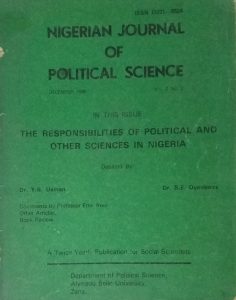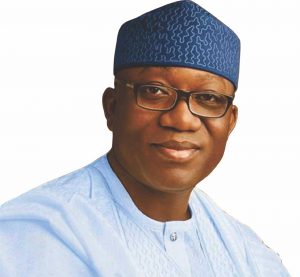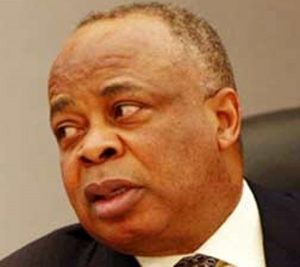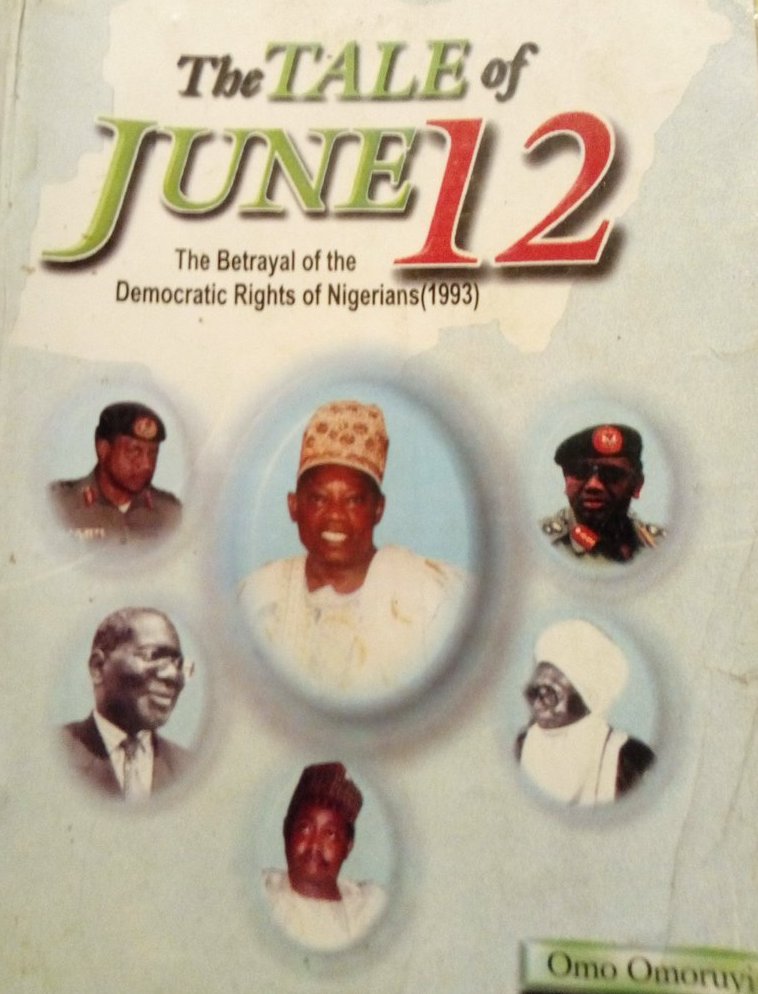 Professor Gani Yoroms who has variously been Directing Staff/Research Assistant to the Director-General of the defunct Centre for Democratic Studies, (CDS) in Abuja, Nigeria as well as the Provost, Centre for Strategic Research and Studies at Nigeria’s National Defence College, provides another view on Nigeria’s June 12 imbroglio from where he was located in that struggle
Professor Gani Yoroms who has variously been Directing Staff/Research Assistant to the Director-General of the defunct Centre for Democratic Studies, (CDS) in Abuja, Nigeria as well as the Provost, Centre for Strategic Research and Studies at Nigeria’s National Defence College, provides another view on Nigeria’s June 12 imbroglio from where he was located in that struggle
The date was November 1993 .I arrived Westin Hotel Boston USA from Abuja with my own version of what transpired in Nigeria leading to the annulment of the June 12 elections. I had written a book with the title ‘Democratisation in Nigeria: Myth and Reality’. I brought the book to the African Studies Association (ASA) Annual Conference where I had also organised a panel discussion on ‘Democratization and Military in Transitional Regime (sic)’. Professor John Paden and Professor Robert Mortimer, the two of the most renowned Africanists participated in the discussion. Earlier on in 1992, I met the two professors while on a panel of scholars sponsored by the African Studies Association for a conference in Seattle, Washington State. Then, I presented a paper on ‘Nigeria and ECOMOG’, addressing the intervention of the Nigerian military in the Liberian crisis. The presentation drew a lot of attention. Mr. Nelson Brown, the Voice of America correspondent who interviewed me made profuse commentaries on the role of Nigeria in Africa and the growing drive for democratisation.
Unfortunately, as I was returning to the US in 1993, the global expectation for democracy in Nigeria had crashed. The most celebrated June 12 elections had been annulled. What were the causes? Who caused it? Would it be de-annulled? These were the burning questions on the mind of the African Scholars at the Westin Hotel Boston in the winter of 1993. I met with Richard Sklar and Richard Diamond among others. Even when I gave Diamond one of his publications which the Centre for Democratic Studies had published, he only expressed his appreciation without enthusiasm. However, these were the same concerns the staff of the Centre for Democratic Studies had expressed when we complained to Professor Omo Omoruyi. The later kept assuring us to have faith. He was very hopeful that the annulled June 12 elections would be de-annulled. Until I left for the ASA conference in Boston, there was no sign to that affect. It was difficult explaining to the teaming elite in Boston as to what really happened.
As a young Research Fellow and also a Research Assistant to the Director General, Centre for Democratic Studies, it was believed I had all details that led to the annulment. Behold, on the following day, at the entrance of the hotel I stumbled on one tall, lanky, dark young scholar distributing his publications ‘Nigeria Now’. He gave me a copy of the magazine. He discovered I arrived from Abuja. The publication carried a bold lead title “’SO JUNE 12 IS GONE?’ It turned out I was talking to Dr John Kayode Fayemi. He was one of the brains behind the struggle for the actualization of June 12. He coordinated the operation of Radio Kudirat, and used the Centre for Democracy and Development (CDD) as platform for propaganda for the actualization of June 12.
I tried to explain the effort of the Centre, a research and training institute stuffed with scholars in the field of political Science. Indeed, the era was a golden period for Nigerian political scientists. The Centre served as platform which provided a paradigm shift for a deeper intellectual rebirth. It articulated variables that reshaped the thinking and behavioural patterns and attitudes of the citizens to the Nigerian state and its politics. It was pedagogy of civic and political education for the citizens. It led to the breeding of ‘new breed politicians’. It was indeed a conscious platform intended to make citizens have informed choices. Politicians were given compulsory certification training programmes from grassroots up to the elective federal posts. Courses included arts of democratic governance, parliamentary drafting and law making, good governance and democratic rule, Constitutional development, Rule of Law and Human rights, Political behaviour and political campaign management among others.


June Twelvevist and incumbent governor of Ekiti State
Indeed the Centre set out to professionalize political Science. As Ibrahim Muazzam and Jibrin Ibrahim alluded in their work, Nigerian Political Scientists wanted to void a situation where “ignorant lawyers and politicians have always been in the forefront of both constitution making and political engineering in Nigeria while the experts, the scientists of politics were either too few or too marginalized by our ‘legal rivals”. Engaging in polemics with the late Bala Usman at Ahmadu Bello University in the 1980, Professor Sam Oyovbaire contended for the end to the separation between scholars (political scientists) and actors (politicians): The essential role of political science is to sensitize and socialize ; it is not to legitimize or subvert…’ the process. To this extent, Eme Ewa, our Karl Deutsch, noted that political scientists ‘have a duty to enter into the field of practical politics to construct the good state’. It was painful that the ‘good state’ that was to be constructed on the template of June 12 to drive the quest for democracy was trashed.
Thus for a period of over 20 years The June Twelvists like Dr Kayode Fayemi were asking “so June 12 is gone?’ President Jonathan’s much later effort to actualize June 12 with his proposal to set up the Institute for Democratic Governance at the University of Lagos was botched. However, when in 2018, President Mohammadu Buhari declared June 12 as Democracy Day, I was wondering if it was possible. Nevertheless, my mind sharply reflected on what transpired in Boston in November 1993 when I met Dr Fayemi with copies of his journal. He gave me a copy on gratis, probably to bring the message back to Aso Rock that on June 12 he stands. Indeed, I did. I was always engaging Professor Omo Omoruyi on June 12. He kept telling me ‘Yoroms, have faith’. My friend Femi Akinola, also senior colleague in Omoruyi Office was tasked with working for the publication of Omoruyi‘s book on ‘June 12’. In 2004 he visited me in Abuja to sample my opinion on how we could do the launching of the Omoruyi book on June 12.
The struggle to actualize June 12 as a symbol of new Nigerian democratic culture was pursued from different angles. Some of us from the defunct Centre for Democratic Studies (CDS) were in the heat of it. We didn’t want the credibility of June 12 to go underfoot. However, our efforts were frustrated when the government of General Sani Abacha scraped the Centre. We were transferred to various government establishments. We watched with agony, in the course of time, the difficulty of how to actualize June 12 as a beacon of democracy.
Nevertheless, the opportunity offered itself in 2006 when Senator Ken Nnamani became the Senate President. One of us, Fatai Jimoh worked with him. He informed me how the then Senate President had been convinced on the need to re-establish the Centre. He asked me to provide a draft bill. I provided one which was made available to other colleagues for their inputs. We supported Jimoh from the background. We were at the Public Hearing where some of us made some comments. After that public hearing, the Institute for Democratic and Legislative Studies (IDLS) was created by an Act, to be headed by a Rector who should be assisted by two Deputy Rectors, each in charge of the School of Democratic Studies, and the School of Legislative Studies. We were all delighted for the return of the Institute. Even with some referral changes, we still believed it would be an academic centre of excellence but, indeed, a professional pedagogic fountain for the training of the political class.
Somehow, shortly after its establishment, Obasanjo’s regime exited from office. It was left for President Umar Musa Yar’Adua to sign the bill into law. He did on July 30th, 2007 but failed to inaugurate the board of the institute. I reached out to colleagues to get the government inaugurate the board but to no avail. At this period also, the government of President Yar’Adua was accused of being a benefactor of the 2007 fraudulent election. To regain credibility, he set up the Justice Uwais Electoral Reform Committee. The Committee in its final report recommended the re-establishment of the Centre for Democratic Studies to “facilitate inter-agency cooperation and engage with civil society in the conduct of civil and political education”.


Sen. Ken Nnamani, the then Senate President
The Committee was oblivious of the fact that the law establishing the Centre had been signed. I reached out to Professor Jibrin Ibrahim, a member of the Committee and to Professor Sam Egwu of the Nigerian Political Science Association (NPSA) among others, for necessary steps. Unfortunately nothing was done or could be done. This shattered my dream for an institute of the sort that would provide intellectual professionalization of political science, in terms of civic and political education. I believe this was the basis on which New Partnership for Africa’s Development (NEPAD) had voted the sum of N3.5billion as a takeoff grant to the Institute. Unfortunately there were allegations that when members of the NASS saw the budget, they began to salivate. The Chairman of the Senate Committee on Rules, Ethics and Privileges, Senator Ita Inang and his colleagues began to develop an unusual interest on the subject. They began to accuse the Presidency of not being interested in the establishment of the institute. They called on the Executive arm to reverse itself of this ‘policy of inconsistency’ or else NASS was going to take over the institute. It set ‘Legislative Compliance Committee’ obviously to intimidate the Executive to implement all Acts and Resolutions of the National Assembly. Also, some ad-hoc staff of NASS from the Parliamentary Research Programmes joined the members of the NASS to advocate for an amendment to reverse the law placing the institute as a parastatal under the Executive. The superficial argument put forward was the inability of the Executive arm of government to inaugurate the Board of the Institute. This had, in their view, necessitated the need to amend the law for the Institute to be re-named ‘Institute for Legislative Studies’ under the NASS. The process of the amendment was by a fiat decision of the principal officers of the NASS without any legislative motion in the two chambers.
Some of us kicked against this move. The African Institute for Security and Development Studies wrote a letter to the Senate President, David Mark, warning against the consequences. Our position was disregarded as the National Institute for Legislative Studies (NILS) was created with legislative impunity. The 7th NASS saw what I did not see – the NEPAD budget. Meanwhile the 8th NASS realized the emptiness of such an Institute without its democratic component, decided to re-create and re-name the institute as ‘National Institute for Legislative and Democratic Studies’ (NILDS). This also was done with legislative fiat without recourse to due process of law-making.
For whatever reasons, another move is on to change the name again to ‘Centre for Excellence for African Governance’. This is indeed becoming ridiculous. I believe Professor Suleiman should advise against this. We want the Institute to consolidate democracy through political pedagogy which the defunct Centre under Professor Omo Omoruyi was noted for. It should establish Azikiwe-Balewa Fellowship for Democratic Governance; provide Strategic Policy and Political Leadership Management courses and certification (of Member and/or Fellow, Institute of Democratic Studies and or Legislative Studies) of competences for its trainees. It should build a legacy of producing an annual Nigerian Political Development Review, a barometer for assessing our political progress.
Finally, let me congratulate President Muhammadu Buhari for the symbolic actualization of June 12 as a retooling mechanism for the consolidation of democracy in Nigeria. I congratulate His Excellency Governor Kayode Fayemi and numerous June Twelvists who stood firm to see to this symbolic overture. For historical purpose, government should complete the announcement of the results of the June 12 Presidential election. In addition, a June 12 University should be established with NILDS becoming its main research institute.




























